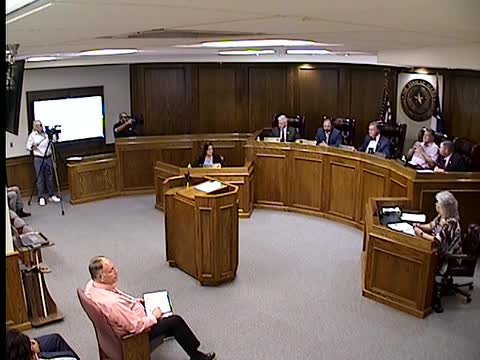Lubbock County Commissioners Debate Tax Rates Amid Budget Shortfalls and Employee Concerns
August 25, 2025 | Lubbock County, Texas
Thanks to Scribe from Workplace AI , all articles about Texas are free for you to enjoy throughout 2025!

This article was created by AI using a video recording of the meeting. It summarizes the key points discussed, but for full details and context, please refer to the video of the full meeting. Link to Full Meeting
During the meeting, County Commissioner Dahlia expressed strong opposition to the NNR, stating it would hinder funding for critical public safety services, including support for volunteer fire departments and law enforcement. She emphasized the need for adequate funding to maintain operational capabilities and retain skilled employees, warning that the NNR could lead to layoffs and a decline in service quality.
The preliminary budget discussions revealed a projected deficit of $5.8 million, prompting calls for departments to reduce their budgets by 10%. However, many departments have yet to comply with these reductions, raising concerns about the county's financial health. Commissioner Dahlia highlighted that costs have risen significantly in recent years, and the NNR does not account for these increases, potentially leading to a detrimental impact on community services.
In contrast, supporters of the NNR argued that it reflects the will of the voters and maintains Lubbock County's reputation for fiscal conservatism. They pointed out that adopting the NNR would prevent a tax increase, which they believe aligns with the community's desire for lower taxes. However, critics countered that this approach could result in lost funding opportunities and a decline in service quality.
The meeting also addressed ongoing infrastructure projects, including an agreement for preliminary engineering services with Lubbock and Western Railway for improvements at a railroad crossing, and the second phase of a fuel system restoration project. These initiatives are part of broader efforts to enhance county services and infrastructure amid financial constraints.
As Lubbock County navigates these budgetary challenges, the implications of the NNR decision will be closely monitored by both officials and residents, with potential impacts on public safety, employee morale, and community services at stake. The court's decision underscores the ongoing tension between fiscal responsibility and the need for adequate funding to support essential services.
Converted from Lubbock - Commissioners' Court meeting on August 25, 2025
Link to Full Meeting
Comments
View full meeting
This article is based on a recent meeting—watch the full video and explore the complete transcript for deeper insights into the discussion.
View full meeting
